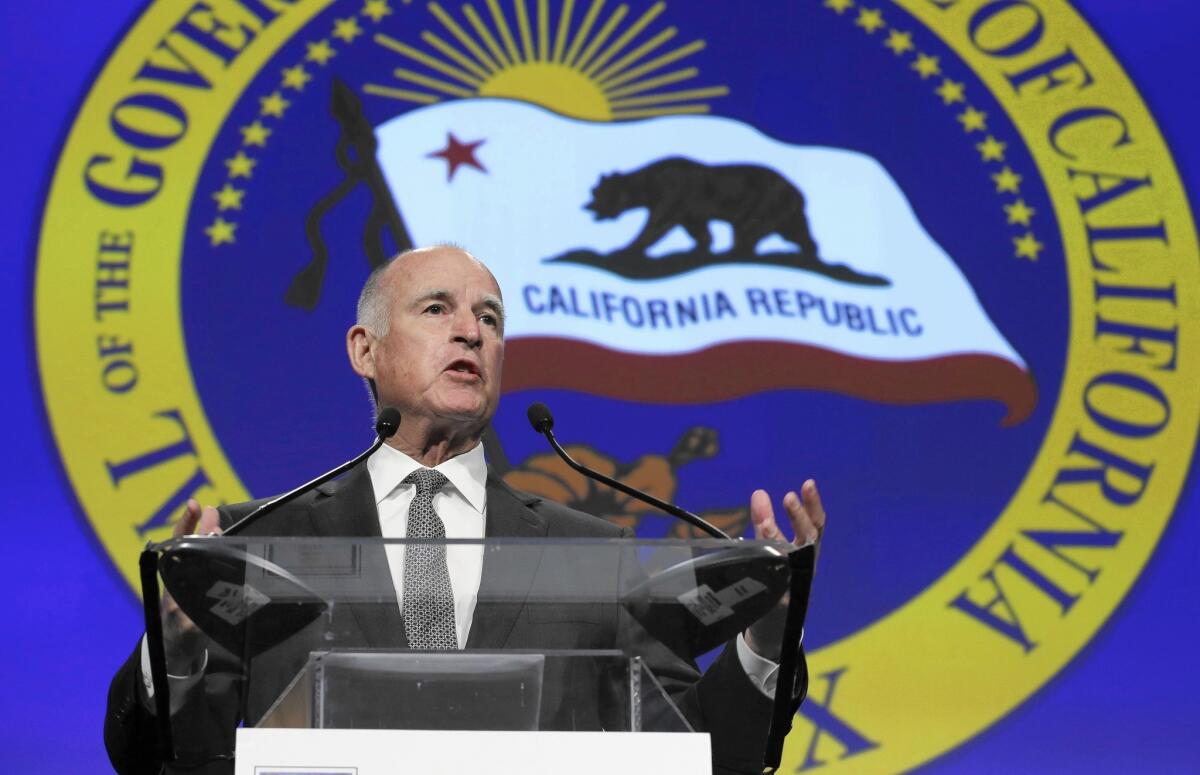Capitol Journal: Legislature’s action on ‘right to die’ bill is fair and square

Gov. Jerry Brown called a special session of the Legislature to focus lawmakers’ attention on healthcare financing. Several lawmakers saw an opportunity to revive a “right to die” bill.
- Share via
SACRAMENTO — Can’t win by the current rules? Change them. The opposing team is too tough? Bench its troublesome players.
Politics, after all, is the art of the possible. Nineteenth century German Chancellor Otto von Bismarck said that. He also said, to paraphrase, that laws are like sausages. If you’re squeamish, don’t watch either being made.
They’re making lots of sausage now in the California Legislature as it rushes to adjourn for the year. Rules are being stretched. Hurdles lowered.
And why not? All’s fair in love and war and legislative games-playing.
A prime example is the fight over the “right to die” bill.
The measure, modeled after an Oregon ‘death with dignity’ law, would permit Californians with fewer than six months to live to end their suffering by taking lethal drugs prescribed by a physician. There’d be protections against abuse.
Two doctors would have to confirm that a patient was terminal and mentally competent. The patient would need to make two oral requests to a physician at least 15 days apart, with witnesses. The doctor and patient would have to meet once alone. The medication would have to be self-administered.
To protect hospitals and physicians from acting against their beliefs, none would be required to participate.
The bill passed the Senate in June on essentially a party-line vote — Democrats for, Republicans against. But it stalled in the Assembly Health Committee. There, a handful of Southern California Democrats, mostly Latinos under pressure from the Roman Catholic Church, withheld support. So backers shelved the measure, presumably until next year.
But last week, backed by legislative leaders, sponsors smartly seized an opening created inadvertently by Gov. Jerry Brown. The governor, impatient with the Legislature’s inability to create a new revenue stream for fiscally ailing public healthcare, had called a special legislative session.
He wanted to focus the lawmakers’ attention on healthcare financing. And in a special session, legislating can be expedited. But more important for “right to die” sponsors, committee lineups are shuffled.
The sponsors inserted their proposal into the special session after checking with legislative parliamentarians to make sure the move was legal.
So now the Health Committee for the special session excludes five Democrats who had not supported the bill in the regular session. And it looks like clear sailing to the Assembly floor.
“Heavy-handed,” “running roughshod” and “clearly abusive,” charged Californians Against Assisted Suicide, a coalition of Catholic, disability and oncologist groups.
Some disability activists fear the bill could be used by family members and insurance companies to get rid of burdensome and costly patients.
Brown hasn’t taken a position on the measure. But, through a spokeswoman, he criticized the legislative corner-cutting.
“This important issue merits careful consideration,” said Deputy Press Secretary Deborah Hoffman. “The process already well underway with the two-year bill … is more appropriate than the special session.”
The governor, I suspect, just wants to keep the Legislature focused on his agenda and not distracted by someone else’s.
But for Brown to criticize any legislative process seems a bit self-righteous and hypocritical. In the past, out of public view, he has orchestrated several midnight, backroom, corner-cutting deals.
Just two examples: Shoving his 2012 tax increase initiative to the head of the ballots’ proposition pack. Capping school district reserves last year to appease the teachers union and free up more money for collective bargaining.
At least the “right to die” bill will need to undergo four more public committee hearings to pass. There already have been four. That’s what I call, to answer the governor, “careful consideration.”
“We do a lot of things at the end of a session that some may claim don’t get enough sunlight, but this one is going to get a lot of sunlight,” says Sen. Lois Wolk (D-Davis), one of the principal sponsors.
Another chief sponsor, Assemblywoman Susan Eggman (D-Stockton), asserts: “If it’s inconvenient for the governor right now, well, you know, people are dying without options, and they don’t have another year to waste.”
A special session bill generally becomes law 90 days after adjournment. In this case, the effective date probably would be in mid-December. If the Legislature didn’t pass the bill until next year in regular session, it wouldn’t take effect until Jan. 1, 2017.
There’s a group poised to sponsor a 2016 ballot initiative if the legislation fails.
“If I were the Catholic Church I’d back off right now,” says Sen. Bill Monning (D-Carmel), a major co-author. He notes that an initiative might not include all the protections for Catholic hospitals.
Monning adds: “Our goal is not to change church doctrine [but] religious freedom doesn’t mean you can force others to live by your beliefs.”
The church isn’t likely to back off.
Speaking to a Pro-Life Leadership Conference recently, Los Angeles Archbishop Jose H. Gomez hailed the church’s “temporary victory” over the bill but warned of an ongoing fight. “We need to acknowledge,” he said, “that the evils of abortion and euthanasia exist … in a culture that has become totally secularized and de-Christianized.”
Well, here’s one Christian who believes that people should be allowed to die peacefully and painlessly while following their own faith.
And legislators should be — and are — free to set their own rules for sausage-making, assuming they follow the state Constitution.
Twitter: @LATimesSkelton
More to Read
Sign up for Essential California
The most important California stories and recommendations in your inbox every morning.
You may occasionally receive promotional content from the Los Angeles Times.











